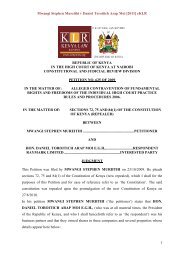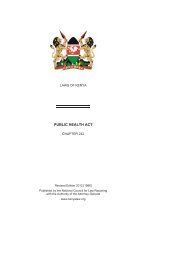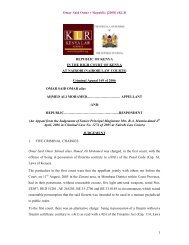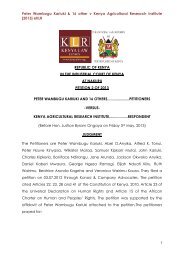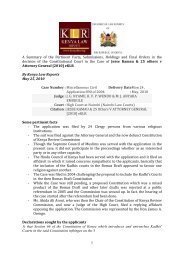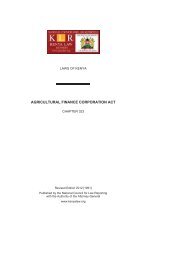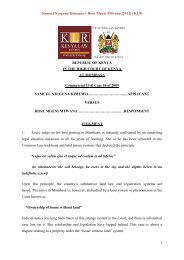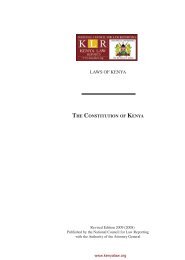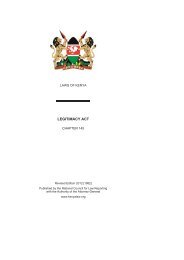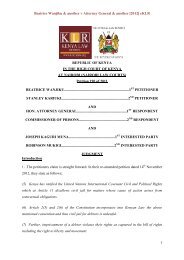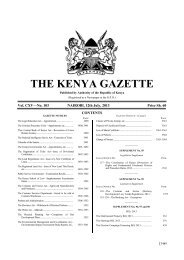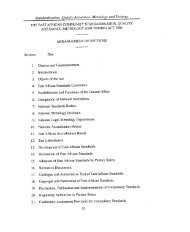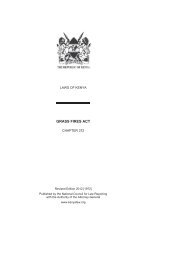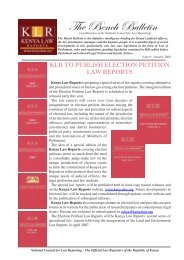Bench Bulletin - Issue 12 - Kenya Law Reports
Bench Bulletin - Issue 12 - Kenya Law Reports
Bench Bulletin - Issue 12 - Kenya Law Reports
You also want an ePaper? Increase the reach of your titles
YUMPU automatically turns print PDFs into web optimized ePapers that Google loves.
KENYA LAW REPORTS<br />
BENCH BULLETIN<br />
FROM THE COURTS — HIGH COURT<br />
In opposing the Notice of Motion, the Registrar deponed that she had written to the Party highlighting the transitional<br />
provisions under section 44 of the Political Parties Act. The provisions specified that the political parties that were<br />
in existence when the Act came into force had 180 days to apply for full registration and the period was to expire on<br />
December 31, 2008. However, the applicant failed to meet that deadline and the voters register ceased to exist after<br />
the Constitutional Amendment Act, 2008 came into force on December 29, 2008 which amended Section 41 of the<br />
Constitution creating the Interim Independent Electoral Commission (IIEC), which became the successor of the Electoral<br />
Commission of <strong>Kenya</strong> (ECK). The ECK having been disbanded, the Voters’ Register was done away with.<br />
Held:<br />
1. Section 18 of the Political Parties Act required all organizations which functioned as political parties to be<br />
registered in accordance with the Act. Subsection (2) allowed for provisional registration of a proposed party. A<br />
provisional registration was required to be accompanied with the party’s Constitution and then comply with Section<br />
19. Section 23 set out the requirements for full registration. A proposed party must have been previously registered,<br />
with not less than two hundred members who were registered voters for purposes of parliamentary elections from<br />
each province. The applicant having had provisional registration, he had to comply with the rest of the requirements<br />
before full registration.<br />
2. The applicant could not comply with Section 23 of the Political Parties Act in order to be fully registered as by June<br />
2009 when he submitted his documents, the Constitution of <strong>Kenya</strong> (Amendment) Act had come into operation and the<br />
ECK and the voters register had been done away with. There was nothing to compare with to confirm the membership<br />
of the party. The Registrar was therefore correct in declining to accept the applicant’s documents till the IIEC could<br />
come up with another voters’ register.<br />
3. Section 41 A (d) of the Constitution of <strong>Kenya</strong> (Amendment) Act, 2008 gave the IIEC the mandate to create a new<br />
voters register and undertake registration of voters. The applicant had been caught up in the web of time between the<br />
repealed provisions of the Constitution and the coming into force of the Political Parties Act.<br />
4. The Registrar had not acted illegally but strictly in accordance with the law. The party could not be registered in<br />
contravention of to the requirements for registration. For an act to be illegal the Registrar had to have acted contrary<br />
to the provisions of the law or misunderstood the law that regulated his decision in this case, the Political Parties Act<br />
and the Constitution of <strong>Kenya</strong> (Amendment) Act, 2008.<br />
5. By ‘illegality’ as a ground for judicial review the decision maker had to understand correctly the law that regulated<br />
the decision making power and had to give effect to it. The Registrar’s decision was within the law and could not be<br />
faulted.<br />
6. The applicant had to wait for the IIEC to come up with another voters register so that he could comply with sections<br />
18 and 23 of the Political Parties Act.<br />
7. In Judicial Review the grounds to be relied upon in the Notice of Motion were those pleaded in the statutory<br />
statement and none could be introduced during the hearing of the Notice of Motion. Order 53 Rule 4 (1) of the Civil<br />
Procedure Rules barred an applicant from relying on any other grounds except those set out in the statement. The<br />
applicant purported to introduce other grounds of malice or bias in his arguments but those were not pleaded and<br />
hence were unacceptable.<br />
Application dismissed.<br />
Advocates<br />
Isaiah Gichu Ndirangu for Applicant<br />
Mr. Kipkogei for Respondent<br />
Jurisdiction of a Provincial Land Disputes Committee<br />
Issack Maina Murathe v Jesidah Wanjiru Murathe<br />
Civil Appeal No 87 of 2007<br />
High Court at Embu<br />
Karanja. J<br />
February 16,2010<br />
Reported by Andrew Halonyere<br />
Land law –jurisdiction of the Provincial Land Disputes Committee – where the Provincial Land Disputes Tribunal directed<br />
the sub-division of the appellant’s land and issuance of land title deeds to the respondent – whether the Tribunal had<br />
jurisdiction to interfere with the appellant’s proprietory rights – whether the Tibunal acted ultra vires the Land Disputes<br />
Tribunals Act –whether the appeal had merit- Land Disputes Tribunal Act of 1990 section 3(1).<br />
The Provincial Land Disputes Committee directed that the appellant’s land be sub-divided and the respondent be<br />
given one acre and title documents to the land. Being aggrieved, the appellant brought an appeal to the High Court<br />
challenging the decision of the committee.<br />
<strong>Issue</strong> <strong>12</strong>: April-June 2010<br />
71



